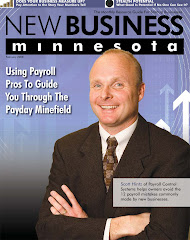I was talking to a leading loan officer at a major bank the other day about the needs of startup businesses. He nearly groaned at the prospect of dealing with startups. "Tire kickers," he called them. "I don't have time to hold their hands."
Now, he admitted he was atypical of other lenders. But I was taken aback. It was my belief that most businesses would be very open to the prospect of working with a startup company as a way of developing a relationship that will grow.
So here is the question of the day for all you startups: what kind of reception to you get with talking to lenders, printers, etc. Are you treated as a tire kicker or as a valued future business relationship?
If you've been snubbed by one supplier as you researched costs for your business plan, were you hesitant to call the next one?
Do people make you feel as if you're wasting their time or are they patient and open?
Are there any businesses out their that have been outgoing, proactive in trying to connect with you since you filed for your Minnesota business name?
NewBizMinn
Business Failure/Success: Keeping Score
I've been researching my chances of succeeding by Googling and Dogpiling every combination of the words, "startup," "small business," "success," and "failure."
Here's what I've learned. Depending on the definition of "failure," most of us -- 90 percent some say -- won't make it five years. It's like having colon cancer with a huge debt and a payroll. Then someone breaks down the numbers and recalculates. It appears that the negative analysis considers a business a failure even if it's not.
For example, after five years, a woman moves to California because her husband got promoted. She closes her salon and opens a new one in California. Failure? No way.
Consider the case of the guy who ran his business for four and a half years and then sold it. Oh, his business never made it to five years....failure.
Another woman has a great business going, then gets offered the job of her life. She shuts down and moves on. Not a failure.
You get the picture.
So, now you adjust the focus and come up with a number that is closer to 66% of new business making it to year five on good terms. That means that 34% of new business actually fail to make it to year five. That's not so bad.
There is the old story of a landing craft filled with 19 year old soldiers preparing to land on the beaches of Normandy. Men, they are told, half of you will be killed before you reach the beach. One kid looks at the peachfuzz-face next to him and thinks, "Poor bastard."
Lesson? Failure is not an option and besides, I'm not that other poor bastard.
Tell me, what do you think the real odds are for a new business succeeding, er...not failing?
NewBizMinn
Here's what I've learned. Depending on the definition of "failure," most of us -- 90 percent some say -- won't make it five years. It's like having colon cancer with a huge debt and a payroll. Then someone breaks down the numbers and recalculates. It appears that the negative analysis considers a business a failure even if it's not.
For example, after five years, a woman moves to California because her husband got promoted. She closes her salon and opens a new one in California. Failure? No way.
Consider the case of the guy who ran his business for four and a half years and then sold it. Oh, his business never made it to five years....failure.
Another woman has a great business going, then gets offered the job of her life. She shuts down and moves on. Not a failure.
You get the picture.
So, now you adjust the focus and come up with a number that is closer to 66% of new business making it to year five on good terms. That means that 34% of new business actually fail to make it to year five. That's not so bad.
There is the old story of a landing craft filled with 19 year old soldiers preparing to land on the beaches of Normandy. Men, they are told, half of you will be killed before you reach the beach. One kid looks at the peachfuzz-face next to him and thinks, "Poor bastard."
Lesson? Failure is not an option and besides, I'm not that other poor bastard.
Tell me, what do you think the real odds are for a new business succeeding, er...not failing?
NewBizMinn
Subscribe to:
Posts (Atom)

